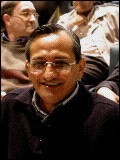 Pascual
Chavez Villanueva is the new Rector Major of the Salesians of Don
Bosco. After a process of discernment, the Capitular Assembly converged
on his name and chose him to lead the Congregation for the six-year
period, 2002-2008.
Pascual
Chavez Villanueva is the new Rector Major of the Salesians of Don
Bosco. After a process of discernment, the Capitular Assembly converged
on his name and chose him to lead the Congregation for the six-year
period, 2002-2008.
Fr. Chavez, a Mexican, was born on Dec. 19, 1947
at Real de Catorce (San Luis de Potosì), a mining area in the
centre of Northern Mexico. Some years later, his family moved to Saltillo
(in the state of Coahuila) where Pascual attended the Salesian school,
“Colegio Mexico”; this is where his vocation began and
he pursued his goal of following Don Bosco. He made his first profession
at Coacalco in August 1964, and became a perpetually professed Salesian
at Guadalajara in August 1970. He received the diaconal ministry on
the 10th of March 1973, again at Guadalajara, and was ordained a priest
on the 8th of December 1973 at “Perla Tapatia”, the capital
of the state of Jalisco. He spent the first years of his ministry
among the young Salesians of the formation community of Chapalita
(Guadalajara). From 1975 to 1977 he studied at the Biblical Institute
in Rome where he obtained his Licentiate in Sacred Scripture.
The new Rector Major was the Rector of the Theological
Institute of San Pedro Tlaquepaque from 1980 to 1988 where he taught
Sacred Scripture. From 1986 to 1989 he was also a Provincial Councillor
of the Province of Mexico-Guadalajara. From 1989 to 1994 he was Provincial
of the same Province, which comprises the whole northern part of Mexico
right up to the border with the United States. In 1995 he began his
Doctorate in Biblical Theology and took up residence at Madrid-Carabanchel
where he stayed till he obtained his degree from the Pontifical University
of Salamanca (Spain). In 1996, during the GC24, Fr. Vecchi called
him over the telephone and asked him to become a regional councillor,
even though he was not a member of that Chapter by right. He accepted,
and transferred to the Generalate in Rome where he presently resides.
Apart from the GC25, Fr. Chavez did also take part
as a Chapter member in the GC23 of 1990, for which he worked as a
member of the precapitular commission.
The new Rector Major’s mother tongue is Spanish,
but he is also fluent in English and Italian, and understands German,
French and Hebrew as well.
In addition to his ecclesiastical degrees, Fr. Chavez
is also a qualified teacher in scientific subjects. Both the types
of formation have made him a solidly spiritual person.
Those who know him and have worked with him describe
him as an intelligent and mentally organized person, and a man of
dialogue who tackles problems without delay. He gets to the heart
of a problem and tackles it at its roots, with firmness and perseverance,
involving the parties concerned and guiding them towards a solution.
He draws near to people without falling into paternalism. Because
of his preparation, depth and practical approach, he was able to finish
each of his study commitments within a narrow time-frame between one
post of responsibility and another, still obtaining results that were
outstanding. A man of profound biblical knowledge, he has a remarkable
feel for situations, and this makes him at once practical and concrete;
at the same time, he has that Latin American sensitivity that adopts
a Christian outlook when looking at man and daily life. He has kept
up to date with the events of life and history, and this has made
him particularly responsive to the signs of the times. A proof of
all this is the enthusiasm he put into consolidating the work of the
oratories begun by his predecessor, Fr. Humberto Meneses, at Tijuana
(Mexico) as a service to the poor and marginalized. Even if he has
not had direct pastoral responsibilities with young people, he has
always had a strong Salesian sensibility for contact with the young
for whose sake he directed the mission as the one responsible for
the province of Mexico-Guadalajara. The young people with whom he
worked in a direct manner were the Salesian students of theology at
Tlaquepaque to whom he imparted not only a scriptural formation but
also his Salesian passion for the young.
As a regional councillor he animated a region comprising
14 provinces, enormously varied in culture, traditions, tenor of life,
religious and Salesian life. In fact, the region takes in the countries
of North and Central America, the Caribbean, and the countries of
the Andes region of South America (Colombia, Venezuela, Ecuador, Peru
and Bolivia). However, through his work of animation he managed to
forge a unity out of such a diversity and made it a point to visit
all the provinces at least once a year during his six-year term of
office.